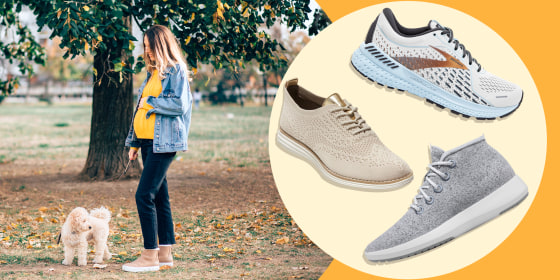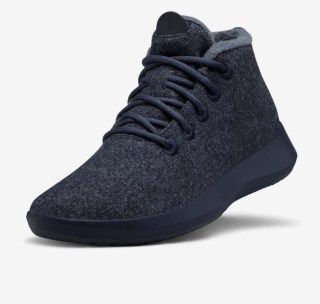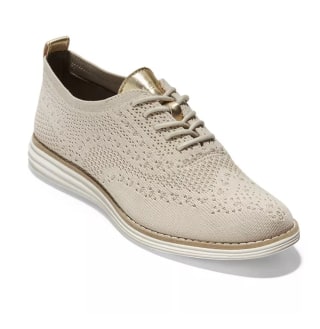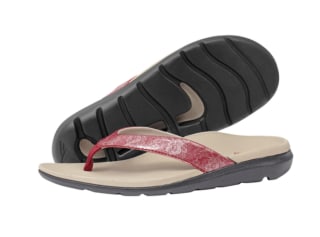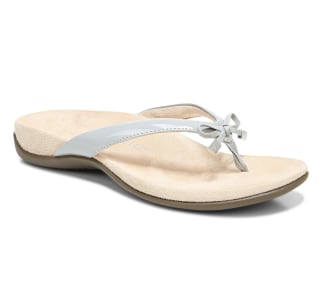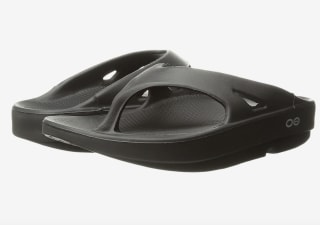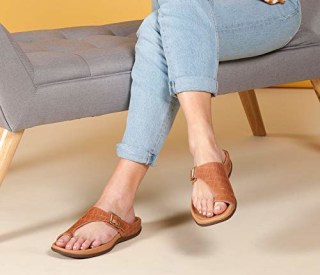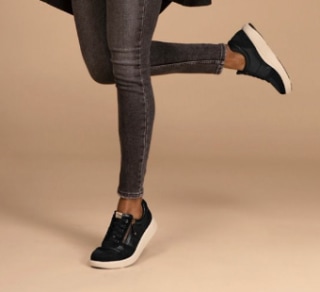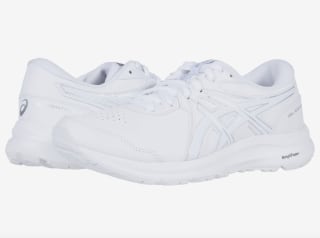Moms-to-be have a lot on their plate. Aside from meeting new challenges that come with their pregnancy, women have to also deal with physical changes — especially their feet. According to the American Orthopaedic Foot Ankle & Society, weight gain and hormonal changes during pregnancy can cause foot growth, joint instability and other muscular pain related to calf swelling and cramping.
While many women want to look trendy and cute during their pregnancy months, podiatrists recommend prioritizing comfort over style. Many of the changes that pregnant women can see on their feet can be exacerbated by the use of high heels and unsupportive shoes. However, there are plenty of ways to look feminine without wearing oversized footwear.
From slip-resistant sandals to running shoes with ankle support, Shop TODAY touched base with podiatrists on the best shoes in the market for those substantial months. They also discussed the major developments your body will experience during pregnancy.
What happens to women's feet during pregnancy?
Expecting a child is a beautiful experience, but it also comes with many trials. Aside from updating your closet to include maternity clothing, your current shoe collection goes on a temporary hiatus. "The further women go into their pregnancy, the need for arch support increases," said functional podiatrist Dr. Emily Splichal.
Though the common notion is that foot width and length increase during this time, pregnant people also have decreased arch height, spider and varicose veins, increase in bunions and hammertoes and accumulation of weight and fluid in the lower extremities. "Pregnancy places a tremendous amount of stress on the foot, which can clearly lead to aches, pain and fatigue," mentioned New York City-based podiatrist Dr. Miguel Cunha.
With foot strain and stress on the rise, it is primordial women consider a change of shoes. The weight of a baby can cause the feet to pronate for abnormally long periods of time. In addition, wearing the wrong footwear can only worsen the pain and can "result in permanent structural changes of the feet, including arch collapse," added Dr. Cunha.
Foot care tips during pregnancy
Like your regular skin care routine, feet also need a beauty regimen. The amount of weight your body will carry during pregnancy should be accompanied by functional, supportive shoes.
Wear compression
During pregnancy, women are more prone to develop blood clots also known as deep venous thrombosis (DVT), which is when blood accumulates in the veins of the lower extremities as they work against gravity. "Wearing compression stockings is important throughout pregnancy to minimize the accumulation of fluid retention in the lower extremities, which can lead to painful achy feet and the formation of varicosities," commented Dr. Cunha.
Wear orthotics
Regardless of your feet and life stage, orthotics can help to redistribute weight evenly across your feet. Dr. Cunha recommends "wearing custom-fitted orthotics as they are personalized support that will alleviate any symptoms of pain and discomfort while maintaining proper alignment of the body."
Exercise
Walking is the safest exercise and an important activity to maintain health during pregnancy. While Dr. Cunha isn't keen on running as an exercise during this time, he counseled to not remain inactive. "Avoid standing or sitting with your legs in a downward position for prolonged periods of time. Doing so will increase swelling in your lower extremities," he noted.
Moisturize
Women will experience dry and cracked heels due to hormonal changes, so it's key to regularly exfoliate and moisturize the skin and legs to avoid loss of elasticity. Also, Dr. Cunha suggested watching out for other changes in appearance and texture. "In some cases, women with thickened, dry, scaly feet assume that [they] need moisturizing with an everyday cream, when in fact what they need is an anti-fungal cream...because they have a fungal infection that is causing the scaliness."
Avoid walking barefoot
While walking barefoot can lead to overexposure to bacteria, it can also cause feet to naturally pronate during the gait cycle. Walking barefoot can cause imbalance, which can alter the biomechanics and distribution of pressure and weight across the foot.
Wear comfortable shoes
Finally, choose a pair of shoes that will support you through daily activities like running errands and exercising.
"Have your feet measured with a Brannock device," recommended Dr. Cunha. "One trick to determine whether the forefront of your shoe is wide enough is to trace your foot onto a piece of paper at the end of the day when your feet are most swollen. Then, place the shoe over the tracing of the foot. If the tracing of the foot is external to the periphery of the shoe, then you know that your shoes are too narrow."
Shoes to avoid during pregnancy
Backless shoes
Though shoe styles like backless loafers and clogs might be a more comfortable option, in reality, this design can accelerate the formation of hammertoes. "Your feet are supporting the slipper, which you can tell with every step," said Dr. Cunha. "You’re crunching down to hold onto the slipper [and] gripping them with your feet. While slippers are totally fine for short-term use, I suggest a sturdier shoe that supports your arch and your foot for extended [wear]."
High heels
Most women ditch high heels during the first trimester, but for those still holding on to their pumps, it is time to store them in a box. "[Women's] increasing belly size can throw off balance, making it harder to walk in high heels," counseled Dr. Splichal.
Dr. Cunha suggests to "avoid wearing anything above a 0.75- to 1-inch heel height. Across the board, I typically recommend looking for a shoe that has slightly less than a 1-inch heel or wedge height rather than one that is completely flat, as it places less tension on the Achilles tendon and will feel more comfortable."
Flip-flops
Surprisingly, this casual sandal can actually be worse than walking barefoot around your home. "When you wear flip-flops, your toes have to constantly grip the flip-flop as you walk with every step, which could cause or exacerbate hammertoes," said Dr. Cunha.
Flat sandals or shoes
"Women’s sandals should have somewhat of a slight heel — less than 3/4 inch — in relation to the front," said Dr. Cunha. "It’s actually better for you than [shoes] that are flat because it takes the stress off the Achilles, which can help with the alignment of your posture, ankles, knees and spine. You should also ensure that the sandal is wide enough in the forefoot, but also that the straps are not too loose to avoid injury. Make sure the shoe is also not flimsy in the middle. If it bends easily, you are not getting adequate support in the arch, which will result in foot pain such as arch [and] heel pain."
What type of footwear can women wear during pregnancy?
Dr. Splichal advised avoiding restrictive shoes such as boots to avoid unnecessary stress and pressure on the feet and legs. "Some recommended shoes that offer proper arch support for pregnant women include Oofos sandals, Cole Haan oxfords and Allbirds," Dr. Splichal added.
Also, be aware that some shoes can also cause swelling on the ankles. For example, some women may want to try a kitten heel for a boost in their style, but this type of heel can make them lose balance. "I recommend that pregnant women should wear comfortable supportive walking shoes while out and a supportive sandal while at home," said Dr. Cunha.
If you're still unsure of how to proceed with buying shoes during pregnancy, a safe bet is to purchase sandals or shoes that have the American Podiatric Medical Association (APMA) seal of approval. These shoes have been found to be beneficial to overall foot health and will have a generous amount of arch support.
Best supportive footwear for pregnant women
Allbirds Women's Wool Runner-up Mizzles
The wet-weather design and high-top silhouette add the perfect support and comfort to swollen feet. These high-rated sneakers are ideal for women in their last months of pregnancy looking for extra support. One reviewer wrote, "My small feet without much padding can be problematic, but Allbirds are my go-to shoe brand. The cushioning, width of the forefoot and overall construction just works."
Cole Haan Oxford Sneakers
If you're not going on maternity leave yet, add a classy pair of Oxford sneakers to your office wardrobe. These sneakers are made with Grand OS Technology for optimal comfort, plus the gold hue provides an elegant feel.
Ascent Groove Sandal
While podiatrists don't recommend wearing backless shoes, this sandal provides superior arch support to prevent overpronation and relieve pain particularly in people suffering from plantar fasciitis. These sandals have a uniquely designed plantar fascial groove and built-in orthotic arch support, which naturally molds to the shape of the foot.
Dr. Cunha also personally loves this style. "During the quarantine, I had the opportunity to fully evaluate the Groove flip-flop. I love these...and I have been wearing them every day after work and on the weekends since the pandemic started back in March."
Vionic Bella Toe Post Sandal
These sandals are adorned with a feminine bow and are a great option if you want to up the ante on your maternity wardrobe. "These flip-flops are lightweight and have a flexible ethyl vinyl acetate (EVA) footbed which absorbs shock, reducing stress on feet, ankles and knees," added Dr. Cunha.
Birkenstock Gizeh Sandals
The Birkenstock flip-flops are modeled on the cork sandal and their footbed will offer the same comfort and arch support you would expect from the brand. They're also ultra-lightweight, highly flexible, shock-absorbent, waterproof and skin-friendly.
Oofos Sandals
Slide into these sandals after rigorous activities. The Oofos sandals are slip-resistant and are ideal if you need a pair to relax your feet in after wearing closed-toe shoes.
Strive Footwear Java Stylish Orthotic Sandal
If you're looking for comfort without compromising style with your maternity outfit, these sandals will serve their purpose. These sandals feature Biomechanical Footbed Technology, which redesigns a classic flat footbed to the natural three-dimensional contours of your feet.
Strive Footwear Madison Sneakers
A luxurious design that can be worn after your pregnancy, these sneakers offer the ultimate chic design for your athleisure style while adding supportive footbed technology.
Best walking shoes during pregnancy
New Balance Fresh Foam
This walking shoe is considered one of the lightest walking shoes available in the market. In addition to being lightweight, the shoe is padded with an extra cushion and is made with synthetic material, making it durable for long-term wear.
Brooks Adrenaline GTS 21
Brooks' sneakers make a great investment if you are a woman on-the-go with a busy schedule. "These shoes are not as lightweight as the New Balance Fresh Foam 1165. However, I highly recommend them for neutral-arched or low-arched people as they provide great stability and have extra passing for shock control," commented Dr. Cunha.
ASICS Women's Gel-Contend Walker
Though this style is heavier than the ones mentioned above, they are very durable and can be worn for longer periods of time. "The advantage of these shoes is that they are designed for all arch types and include Rear Foot GEL Technology and a cushioned midsole, making these shoes one of the most comfortable shoes currently available on the market," added Dr. Cunha.
For more stories like this, check out:
- These are the foundational pieces every wardrobe needs, according to a stylist
- How to shop for the best workout socks — plus 15 expert-approved pairs to try
- If you're tired of hot nights, these cute pajamas can help keep you cool
Subscribe to our Stuff We Love and One Great Find newsletters, and download our TODAY app to discover deals, shopping tips, budget-friendly product recommendations and more!

